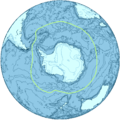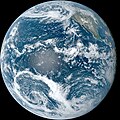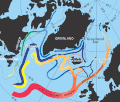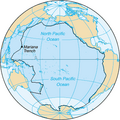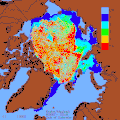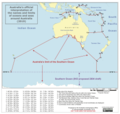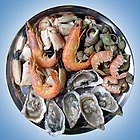Portal:Oceans
The Oceans Portal
A portal dedicated to oceans, seas, oceanography and related topics
– Hover over image and scroll to middle for controls to see more selected panorama images –
Introduction
| Earth's ocean |
|---|
|
Main five oceans division: Further subdivision: Marginal seas |

The ocean is the body of salt water that covers approx. 70.8% of Earth. In English, the term ocean also refers to any of the large bodies of water into which the world ocean is conventionally divided. The following names describe five different areas of the ocean: Pacific, Atlantic, Indian, Antarctic/Southern, and Arctic. The ocean contains 97% of Earth's water and is the primary component of Earth's hydrosphere; thus the ocean is essential to life on Earth. The ocean influences climate and weather patterns, the carbon cycle, and the water cycle by acting as a huge heat reservoir. (Full article...)

A sea is a large body of salty water. There are particular seas and the sea. The sea commonly refers to the ocean, the wider body of seawater. Particular seas are either marginal seas, second-order sections of the oceanic sea (e.g. the Mediterranean Sea), or certain large, nearly landlocked bodies of water. (Full article...)
Oceanography (from Ancient Greek ὠκεανός (ōkeanós) 'ocean', and γραφή (graphḗ) 'writing'), also known as oceanology, sea science, ocean science, and marine science, is the scientific study of the oceans. It is an Earth science, which covers a wide range of topics, including ecosystem dynamics; ocean currents, waves, and geophysical fluid dynamics; plate tectonics and seabed geology; and fluxes of various chemical substances and physical properties within the ocean and across its boundaries. These diverse topics reflect multiple disciplines that oceanographers utilize to glean further knowledge of the world ocean, including astronomy, biology, chemistry, geography, geology, hydrology, meteorology and physics. Paleoceanography studies the history of the oceans in the geologic past. An oceanographer is a person who studies many matters concerned with oceans, including marine geology, physics, chemistry, and biology. (Full article...)
Selected article -

The deep sea is broadly defined as the ocean depth where light begins to fade, at an approximate depth of 200 m (660 ft) or the point of transition from continental shelves to continental slopes. Conditions within the deep sea are a combination of low temperatures, darkness, and high pressure. The deep sea is considered the least explored Earth biome as the extreme conditions make the environment difficult to access and explore.
Organisms living within the deep sea have a variety of adaptations to survive in these conditions. Organisms can survive in the deep sea through a number of feeding methods including scavenging, predation and filtration, with a number of organisms surviving by feeding on marine snow. Marine snow is organic material that has fallen from upper waters into the deep sea. (Full article...)Interesting facts -
- Heather Willauer (pictured) patented a method for removing carbon dioxide (CO2) from seawater, in tandem with hydrogen (H2) removed simultaneously. Willauer has researched catalysts to enable a continuous Fischer–Tropsch process to recombine carbon monoxide (CO) and hydrogen gases into complex hydrocarbon liquids to synthesize jet fuel for Navy and Marine aviation, and fuel for the U.S. Navy's ships at sea.
- The sea cucumber Leptopentacta elongata has a U-shaped or S-shaped body and occupies a burrow in the seabed.
- The POLYGON experiment, conducted in the 1970s, was the first experiment to establish the existence of so-called "mesoscale eddies", giving rise to the "mesoscale revolution" in oceanography.
Selected list articles and Marine habitat topics
| Marine habitats |
|---|
| Coastal habitats |
| Ocean surface |
| Open ocean |
| Sea floor |
- List of oceans
- List of ancient oceans
- List of seas
- List of circumnavigations
- List of cruise lines
- List of largest lakes and seas in the Solar System
- List of marine biologists
- List of marine ecoregions
- List of maritime explorers
- List of naval battles
- List of ocean liners
- List of oceanographic institutions and programs
- List of oldest surviving ships
- List of rogue waves
- List of seafood dishes
- List of submarine topographical features
Tasks
 |
Here are some tasks awaiting attention:
|
General images -
Related portals
In the news
- 21 July 2024 – Red Sea crisis
- 2024 Israeli strikes on Yemen
- The death toll from yesterday's Israeli airstrikes on Al Hudaydah, Yemen, increases to six. (Al Jazeera)
- The Houthis target Eilat, Israel, with multiple ballistic missiles, in response to yesterday's airstrikes in Yemen. (Sky News)
- 21 July 2024 – China–Philippines relations, Territorial disputes in the South China Sea
- The Philippines announces an agreement with China on resupply missions to the beached naval ship Sierra Madre on Second Thomas Shoal in the South China Sea following an incident in June. (The Guardian)
- 20 July 2024 – Red Sea crisis
- 2024 Israeli strikes on Yemen
WikiProjects
Topics
Categories
Associated Wikimedia
The following Wikimedia Foundation sister projects provide more on this subject:
-
Commons
Free media repository -
Wikibooks
Free textbooks and manuals -
Wikidata
Free knowledge base -
Wikinews
Free-content news -
Wikiquote
Collection of quotations -
Wikisource
Free-content library -
Wikiversity
Free learning tools -
Wiktionary
Dictionary and thesaurus
Admiralty law
| Admiralty law |
|---|
| History |
| Features |
| Contract of carriage/Charterparty |
| Parties |
| Judiciaries |
| International conventions |
| International organizations |
Need assistance?

Do you have a question about oceans, seas or oceanography that you can't find the answer to? Consider asking it at the Wikipedia reference desk.
External media

- World Ocean Database and World Ocean Atlas Series – from the U.S. National Centers for Environmental Information, National Oceanic and Atmospheric Administration. Includes the World Ocean Atlas.
- European Atlas of the Seas – the European Atlas of the Seas, from the European Commission
- NOAA Research – NOAA research news, Oceanic and Atmospheric Research (OAR)
- Ocean Research – from The World Ocean Observatory
- Ocean Biodiversity Information System – "a global open-access data and information clearing-house on marine biodiversity for science, conservation and sustainable development"









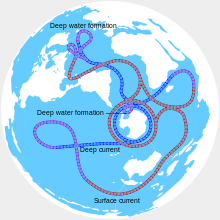











![Image 10"Terres Australes" [sic] label without any charted landmass (from Southern Ocean)](http://upload.wikimedia.org/wikipedia/commons/thumb/8/8e/Geography_world_map.jpeg/120px-Geography_world_map.jpeg)









![Image 20An exclusive economic zone (EEZ) map of the Pacific which excludes non-tropical islands.[why?] (from Pacific Ocean)](http://upload.wikimedia.org/wikipedia/commons/thumb/b/bc/Map_of_the_Exclusive_Economic_Zones_of_the_Pacific_Ocean.png/120px-Map_of_the_Exclusive_Economic_Zones_of_the_Pacific_Ocean.png)










